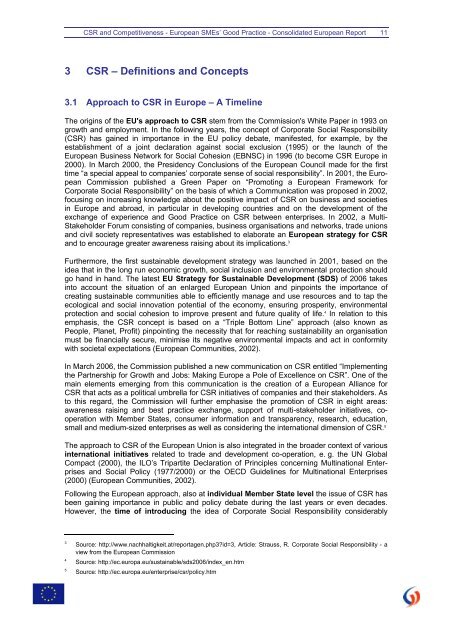CSR and Competitiveness European SMEs - KMU Forschung Austria
CSR and Competitiveness European SMEs - KMU Forschung Austria
CSR and Competitiveness European SMEs - KMU Forschung Austria
Create successful ePaper yourself
Turn your PDF publications into a flip-book with our unique Google optimized e-Paper software.
<strong>CSR</strong> <strong>and</strong> <strong>Competitiveness</strong> - <strong>European</strong> <strong>SMEs</strong>’ Good Practice - Consolidated <strong>European</strong> Report 11<br />
3 <strong>CSR</strong> – Definitions <strong>and</strong> Concepts<br />
3.1 Approach to <strong>CSR</strong> in Europe – A Timeline<br />
The origins of the EU's approach to <strong>CSR</strong> stem from the Commission's White Paper in 1993 on<br />
growth <strong>and</strong> employment. In the following years, the concept of Corporate Social Responsibility<br />
(<strong>CSR</strong>) has gained in importance in the EU policy debate, manifested, for example, by the<br />
establishment of a joint declaration against social exclusion (1995) or the launch of the<br />
<strong>European</strong> Business Network for Social Cohesion (EBNSC) in 1996 (to become <strong>CSR</strong> Europe in<br />
2000). In March 2000, the Presidency Conclusions of the <strong>European</strong> Council made for the first<br />
time “a special appeal to companies’ corporate sense of social responsibility”. In 2001, the <strong>European</strong><br />
Commission published a Green Paper on “Promoting a <strong>European</strong> Framework for<br />
Corporate Social Responsibility” on the basis of which a Communication was proposed in 2002,<br />
focusing on increasing knowledge about the positive impact of <strong>CSR</strong> on business <strong>and</strong> societies<br />
in Europe <strong>and</strong> abroad, in particular in developing countries <strong>and</strong> on the development of the<br />
exchange of experience <strong>and</strong> Good Practice on <strong>CSR</strong> between enterprises. In 2002, a Multi-<br />
Stakeholder Forum consisting of companies, business organisations <strong>and</strong> networks, trade unions<br />
<strong>and</strong> civil society representatives was established to elaborate an <strong>European</strong> strategy for <strong>CSR</strong><br />
<strong>and</strong> to encourage greater awareness raising about its implications. 3<br />
Furthermore, the first sustainable development strategy was launched in 2001, based on the<br />
idea that in the long run economic growth, social inclusion <strong>and</strong> environmental protection should<br />
go h<strong>and</strong> in h<strong>and</strong>. The latest EU Strategy for Sustainable Development (SDS) of 2006 takes<br />
into account the situation of an enlarged <strong>European</strong> Union <strong>and</strong> pinpoints the importance of<br />
creating sustainable communities able to efficiently manage <strong>and</strong> use resources <strong>and</strong> to tap the<br />
ecological <strong>and</strong> social innovation potential of the economy, ensuring prosperity, environmental<br />
protection <strong>and</strong> social cohesion to improve present <strong>and</strong> future quality of life. 4 In relation to this<br />
emphasis, the <strong>CSR</strong> concept is based on a “Triple Bottom Line” approach (also known as<br />
People, Planet, Profit) pinpointing the necessity that for reaching sustainability an organisation<br />
must be financially secure, minimise its negative environmental impacts <strong>and</strong> act in conformity<br />
with societal expectations (<strong>European</strong> Communities, 2002).<br />
In March 2006, the Commission published a new communication on <strong>CSR</strong> entitled “Implementing<br />
the Partnership for Growth <strong>and</strong> Jobs: Making Europe a Pole of Excellence on <strong>CSR</strong>”. One of the<br />
main elements emerging from this communication is the creation of a <strong>European</strong> Alliance for<br />
<strong>CSR</strong> that acts as a political umbrella for <strong>CSR</strong> initiatives of companies <strong>and</strong> their stakeholders. As<br />
to this regard, the Commission will further emphasise the promotion of <strong>CSR</strong> in eight areas:<br />
awareness raising <strong>and</strong> best practice exchange, support of multi-stakeholder initiatives, cooperation<br />
with Member States, consumer information <strong>and</strong> transparency, research, education,<br />
small <strong>and</strong> medium-sized enterprises as well as considering the international dimension of <strong>CSR</strong>. 5<br />
The approach to <strong>CSR</strong> of the <strong>European</strong> Union is also integrated in the broader context of various<br />
international initiatives related to trade <strong>and</strong> development co-operation, e. g. the UN Global<br />
Compact (2000), the ILO’s Tripartite Declaration of Principles concerning Multinational Enterprises<br />
<strong>and</strong> Social Policy (1977/2000) or the OECD Guidelines for Multinational Enterprises<br />
(2000) (<strong>European</strong> Communities, 2002).<br />
Following the <strong>European</strong> approach, also at individual Member State level the issue of <strong>CSR</strong> has<br />
been gaining importance in public <strong>and</strong> policy debate during the last years or even decades.<br />
However, the time of introducing the idea of Corporate Social Responsibility considerably<br />
3<br />
Source: http://www.nachhaltigkeit.at/reportagen.php3?id=3, Article: Strauss, R. Corporate Social Responsibility - a<br />
view from the <strong>European</strong> Commission<br />
4<br />
Source: http://ec.europa.eu/sustainable/sds2006/index_en.htm<br />
5 Source: http://ec.europa.eu/enterprise/csr/policy.htm




